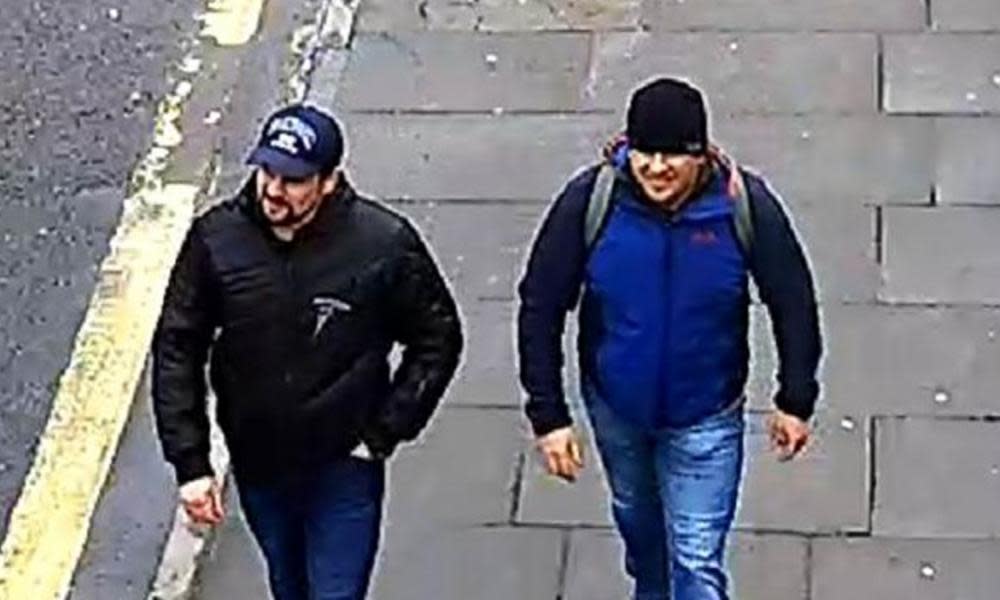Skripal poisoning suspects put on European sanctions list

Two Russians blamed for poisoning the former Russian agent Sergei Skripal and his daughter, Yulia, have been put on a European sanctions list, alongside the leaders of the country’s military intelligence agency, as the EU stepped up its response to the Salisbury attacks.
Nine individuals, four Russians and five Syrians, have been included on a sanctions list that targets those accused of chemical weapons attacks, following agreement by European Union foreign ministers meeting in Brussels.
The list is the first time the EU has targeted people thought to be behind chemical weapons attacks, after a decision in October to broaden the sanctions regime.
Each person will be subject to an EU travel ban and asset freeze. Syria’s Scientific Studies and Research Centre, the agency believed to be in charge of Syria’s chemical weapons programme, has also been added to the list.
In a statement, the British government said the list included Igor Kostyukov and Vladimir Alexeyev, the head and deputy head of the GRU, Russia’s military intelligence agency, which the government said underlined “the responsibility of the GRU in this reckless use of a chemical weapon in Salisbury”.
Also named were two suspected Russian military intelligence officers, who have been identified as Ruslan Boshirov and Alexander Petrov, and were named by police as carrying out the attack. The pair visited Salisbury twice on the weekend of the attack, later claiming they wanted to visit the “wonderful” city to see the cathedral.
British police and intelligence, who traced the pair’s movements around Salisbury in minute detail , believe they were on a mission to kill Sergei Skripal with the deadly nerve agent novichok, disguised in a fake Nina Ricci perfume bottle. A woman from Wiltshire, Dawn Sturgess, died after coming into contact with the deadly nerve agent, while her partner, another novichok victim, Charlie Rowley, fears the poison could kill him within a decade.
The EU foreign policy chief, Federica Mogherini, said the decision to impose sanctions had been taken on a very “strong legal basis”, dismissing criticism from the Kremlin that the men’s guilt was unproven. Earlier on Monday, Vladimir Putin’s spokesman told reporters in Moscow that the EU decision would change nothing and said the UK had not handed over the evidence against the men.

Mogherini said she was confident EU member states had taken a decision on solid legal grounds. “The European Union, before taking decisions, as we have done today on sanctions, has a long and very sound legal assessment of the basis on which we adopt these decision, also because we need to them to be able to resist the test of courts.”
She added the sanctions were “part of our strong commitment and determination on contributing to the preventing of the use of not only chemical weapons, but weapons of mass destruction”.
In a statement, the UK foreign secretary, Jeremy Hunt, said the UK had been at the vanguard of the EU action. “Today’s new sanctions deliver on our vow to take tough action against the reckless and irresponsible activities of the Russian military intelligence organisation, the GRU, which put innocent British citizens in serious danger in Salisbury last year.”
“We have also imposed sanctions on individuals and an organisation responsible for the Syrian regime’s abhorrent use of chemical weapons over many years, including in Douma in April 2018.”
Separately, the EU added 11 Syrian businessmen and companies that support the regime of Bashar al-Assad to another list targeting people who support or benefit from the Syrian leader. The businessmen and companies were described as being involved in luxury real estate and other regime-backed projects.
The UK government has promised to implement all EU economic sanctions in force if it crashes out of the EU without a deal on 29 March. It has also said it wants to continue working with the EU on sanctions after Brexit, after being urged by a Lords select committee to maintain a broadly similar approach.
EU foreign ministers including Hunt, were meeting in Brussels, where they also discussed how to combat disinformation in the run-up to the European elections in May.
They had been presented with an EU paper that warned that “constant targeted disinformation campaigns” against the EU, its institutions and policies were likely to increase ahead of the elections.

 Yahoo News
Yahoo News 
